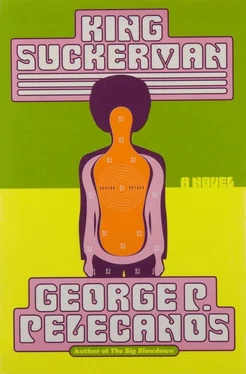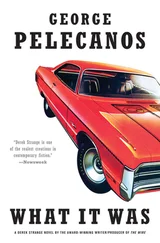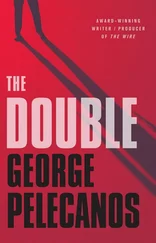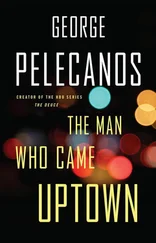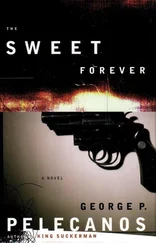So the view, it sucked the high hard one. When the family had asked him to leave Jersey, set up a little business out of town — they were only trying to get rid of him, he knew — they had promised to put him in a nice office in a beautiful part of town. First and Potomac, they said, and when he heard the address it sounded so goddamn right. Like it caught a breeze off the river and shit. Well, it was a few blocks from the water, but not that you could tell, and when the odd breeze did come through, it stank of sulfur and diesel. So here he sat, in a moldy cinder-block building in a hot, treeless, dead-ass warehouse district in Southeast D.C. The absolute shithole part of town.
Eddie would show them, though. He’d stick it out. He’d make something happen down here and then he’d go back to his sweet hometown like the fattest motherfucker who ever rode in on four wheels. He would do that if he ever did one thing.
“Come here, baby,” said Marchetti, spreading his arms out wide.
Vivian looked up from her place on the wine leather couch across the room. She tapped some ash onto her jeans from the joint dangling between her long thin fingers and returned her gaze to the paperback resting in her lap. Keeping her eyes on the page, she rubbed at the ashes until they had disappeared into the denim.
“Hey, Viv!” said Marchetti, more jovial now. “Come on over here, give Eddie Spags a hug.” The kids used to call him Eddie Spaghetti back in Jersey, on account of he was a guido and he did love his pasta. Then Eddie Spags for short, which stuck. Marchetti liked the sound of it. Like it was right out of The Valachi Papers or some shit like that, though Eddie knew down deep that the Marchettis were strictly small-time players, double zeros on the back of a uniform. He and his relatives were about as connected as an amputated leg.
Vivian, still not looking up, said, “How about this, Eddie? How about you get up out of that chair, walk across the room, give me a hug? How about that?”
Eddie said, “Forget it,” though he wished right away he hadn’t spoken so quick. A hug, you never knew, if you forced it just a little, it could turn into something else.
Eddie opened the center drawer of his desk, brushed aside the snub-nosed .38 that lay there, grabbed the remote. Christ, if his own girlfriend was more interested in getting high and reading some make-believe story than paying a little attention to him, he might as well watch a little tube. It felt like a morgue in there, anyway, without the sound of the Sony.
Eddie switched on the set, sighed at the snow running across Dinah Shore’s face.
“Hey, Clarenze!” he yelled, loud as he could. And Vivian looked up.
Clarence Tate was listening to Eugene Record’s tenor, the harmonica drifting in behind the vocal, when he heard the sound of Eddie’s voice. “Oh, Girl,” that was one of the prettiest records the Chi-Lites had ever cut, and Tate had been sitting way back in the other side of the warehouse, just getting into the tortured beauty of the song, doing nothing but minding his own self. It would be just like Eddie to bust on Tate’s groove at a time like that.
Tate got out of his chair, pulled the eight-track from the Capehart compact system, went through the doorway, headed on down the hall.
He passed rows of television sets still in their cartons, stereo systems, compacts and components, some boxed, some not. They’d have to move these right quick. Tate had hooked himself up with a delivery man — cat by the name of Bernard — who drove a truck for the big electronics distributor up in Baltimore. Bernard’s company supplied all of D.C.’s electronics retailers — Luskin’s-Dalmo, George’s, Nutty Nathan’s, and others — with their goods, and Bernard had a deal with one of the warehousemen, who’d load up Bernard’s truck with a couple of extra pieces on every run. Tate figured it wouldn’t be long before either that boy Bernard or the warehouseman would be caught, because that’s the way things always ended for small-time boosters like them. So he thought it’d be a good idea to maximize the profit potential while the getting was still good. Profit potential — he’d been reading books lately on how to run a hard-goods operation. Course, the books never said a damn thing about fencing hard goods. But he figured the basic principles, they had to be about the same.
Didn’t Eddie know you had to turn the inventory so you could take in more goods? Didn’t he know nothin’ about cash flow? No, he didn’t expect that Eddie did. Tate would have to bring up the issue with him soon. Sit down with Eddie, counsel him a little, make up one of those business plans.
That is, if he could keep the fat man focused. The thing that bothered Tate was, Eddie was all over the place, throwing all the balls up in the air at the same time, trying to make that big score. He could do all right if he just kept to moving hard goods in and out of the warehouse. But uh-uh, the man had to be going in ten different directions at once, selling herb, pounds at a time, and now cocaine, brokering a deal between those Southern boys on their way into town and the Howard County bikers. Eddie, he had no idea what it meant to play with bad motherfuckers like that.
Clarence didn’t know why he worried about it anyway. He had never meant to take on all this responsibility. It started when he had gone and answered that Washington Post ad, the one Eddie had placed for an “executive assistant,” the description vague but with phrases thrown in like “sky’s the limit, self-starter,” bullshit hustle like that. He figured he’d take the job for a short while, a transition thing, buy a few things extra for his little girl. Here he was a year later, still wet-nursing the Italian, running the show, strategizing, himself. Didn’t that beat all?
Clarence Tate pushed on the door at the end of the hall, entered the main office. There sat Eddie Spags, eyes kind of glazed, watching the Sony. Who was that, that fool Jimmie Walker, talking all that fast, stupid shit on the screen? And the girl, Vivian, stoned and bored, sitting across the room with her legs tucked underneath her, taking that free ride from Eddie, not even giving it up anymore, just hanging around. One thing he did know: If she was his, Tate would never let her get away with that. Fine as she was, too.
“You call me, Eddie?”
“Yeah. It’s snowin’ on the Dinah Shore set, Clarenze.”
Clarenze. Saying it like he thought the niggers would. Course, no brother had ever called him Clar enze. But Tate knew it would be a waste of time to try and explain it to him. What Eddie knew about the black man was what he picked up off the straight-up bullshit he saw on TV. The man was that kind of thick.
“I’ll get up on the roof, jiggle the antenna.”
“Thanks.”
“And Eddie.”
“Yeah.”
“What’s the schedule lookin’ like for the rest of the day?”
“You know,” said Marchetti. “Little bit of this and that. Got that guy Cooper coming into town sometime today. Wants to talk about the coke deal with those biker fellows I know.”
“And you know Cooper from?”
“He works for a guy by the name of Carlos. Used to be a busboy in my old man’s restaurant back in North Bergen. Went down to Miami a few years back and got himself into some more lucrative shit. Wears shiny suits now with long-collared shirts underneath.” Marchetti winked at Tate. “We keep in touch.”
“Okay.” Tate sighed. “What else we lookin’ at?”
“Greek boy by the name of Karras is coming by. Wants an LB.”
“You know this Karras?”
“Loopy vouched for him.”
“I thought you only sold herb to Loopy.”
Читать дальше
